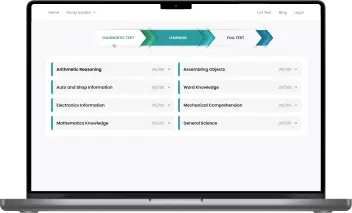Fun & effective GRE practice test tool to pass with flying colors
All-in-one platform with everything you need to ace the GRE on your first attempt
Clear and Thorough Learning Path
Proven GRE 3-step Practice Formula
After our 100,000+ users' success stories, we developed a 3-step strategy to provide you with the most precise and in-depth learning path while minimizing your prep time.GRE Diagnostic Test
First, take this short test and get your detailed report showing your strong and weak areas. Save your time by concentrating on what is in demand.Learning
With quick, bite-sized learning techniques and a detailed study guide for each GRE section, you can really strengthen your weaknesses (from step 1) and boost your scores.GRE Full Test
The last step for your preparation is taking our full GRE practice tests and seeing how far you've come since the beginning. Repeat the 3-step formula until you are satisfied with your results!Ready to start?
Thousands of GRE users already accomplished their goals.NOW it’s your turn!

What You Get

All-in-one platform
A complete GRE Prep Platform, including a diagnostic test, detailed study guides for all topics, practice questions with step-by-step explanations, and various full simulator tests.
Questions nearly identical to those in the real GRE test
All questions are categorized into the specific sections as on the real GRE: Same format & same difficulty!
Best for the busy
Easily & quickly grasp all the knowledge with our unique learning technique. And you can learn anytime, anywhere on any devices, even with a few free minutes.
Practice while having fun
Learn and play! Complete round-by-round to reach your daily achievement and make progress on your learning journey!Featured on















What our users are saying
Over 50,000 aspiring American candidates use GRE monthlyWhat To Know About GRE & GRE Practice Test 2024
The GRE is a test used by some of the world's most competitive programs that help graduate schools identify which applicants are a suitable fit for advanced academic study.
Many students and professionals who are preparing for the GRE are usually unsure of what the GRE is or how to get a head start. The solution to the question "What is GRE?" is detailed below. Furthermore, we will provide you with all of the information you need for this examination.
Also, don't forget to have a look at our website's GRE practice test!
What is GRE test?
The Graduate Record Examination, or GRE, is an essential phase in the application process for graduate school or business school. The GRE is a standardized multiple-choice, computer-based exam that is frequently needed for entrance to graduate schools and MBA programs around the world.
The GRE was designed and is administered by ETS to provide standardized criteria for graduate and business schools to compare applicants' qualifications and readiness for graduate-level academic work.
Your GRE score, as well as your academic record and supporting papers, are used by graduate school and business school admissions committees to judge your preparation for the rigors of graduate academic study.
Why should you take the GRE?
Apart from being one of the most widely approved exams by universities for admission to graduate programs, students interested in MS programs, MBA programs, professional degree programs, or thesis work must take the GRE General Test or GRE exam as part of the university admissions process.
Aside from that, there has been an increasing trend of business schools accepting GRE scores instead of the standard GMAT exam. A growing number of law schools in the United States accept the GRE as an alternative to the LSAT, the typical law school entry exam.
What is on the GRE test?
The GRE is similar to the SAT and ACT exams in certain ways, but the emphasis is on mathematical and verbal thinking. Algebra, basic arithmetic, data analysis, geometry, and college-level vocabulary are all assessed on most GRE tests. Many of the questions will assess your abilities to think critically and solve problems.
On the GRE, there are 3 different scores:
- Analytical writing
- Verbal reasoning
- Quantitative reasoning
Each score corresponds to a separate GRE section. Depending on the exam and your school, some GRE examinations may include an unscored or research component.
Analytical Writing
The analytical writing part assesses your ability to back up assertions with evidence, analyze claims, maintain well-formed arguments, and clearly express complicated ideas and concepts. This is your chance to show off your English writing skills in this first section.
The purpose is to produce as concentrated replies as possible based on the assignments given. Analyzing a problem task and analyzing an argument task are the two elements of the analytical writing section that are timed individually.
- The Analyze an issue task assesses your ability to critically analyze a topic of popular interest. You must give an answer that expresses your personal viewpoint on the subject.
Because each issue can be studied from numerous perspectives, the work comes with a series of guidelines to help you narrow down your solution. To prevent making costly mistakes, carefully read the directions supplied to you.
- Analyze an argument is a task that tests your ability to evaluate, comprehend, and analyze arguments. You will be given a written work by an author who makes specific assertions and gives arguments about a certain topic or event.
Based on the instructions you will receive in the test, you are expected to address and critically assess the coherence of the author's statements.
Verbal Reasoning
The second section of the verbal reasoning test has two sub-sections, each with 20 questions. The purpose of the Verbal Reasoning assignment is to assess a student's ability to summarise key points from a text and to understand the meaning of words, phrases, and texts by recognizing relationships between them.
The emphasis is on making sense of the numerous levels of meaning in order to comprehend the author's writing goal. In the Verbal Reasoning task, you can be tested on three different sorts of questions:
- Text completion
- Reading comprehension
- Sentence equivalence.
Quantitative Reasoning
Finally, a student's ability to interpret and analyze quantitative data is assessed in the quantitative reasoning section. It also uses mathematical models to assess a student's aptitude in algebra, geometry, data analysis, and problem-solving.
During the exam, you will be given an on-screen calculator. Quantitative comparison questions, multiple-choice questions with one or many responses, numeric entry questions, and data interpretation sets are the four sub-sections of this part. The information in this area may be given in the form of tables, graphs, or other formats.
Where can you take the GRE?
To register for the GRE test, you must first create an account with the Educational Testing Service (ETS) and then choose whether to take the GRE General or GRE Subject Test. The GRE can be taken online or at one of over 1,000 test centers.
It is a global test taken by thousands of international students from over 160 nations and is popular among prospective students in the United States. According to the General Test Volume by Country figures from the previous decade, the GRE exam is accessible to the majority of countries with participants from all over the world.
A GRE test at home option may be available if your residency prevents you from visiting a physical test center or if the GRE General Test is not available on a computer at the center of your choosing. However, the home test is unavailable in mainland China and Iran.
There are no changes in the format or duration of the GRE home test compared to the official test in test centers. The only difference is that you use your own computer or laptop and are supervised by a human proctor via ProctorU®. Remember that the home test is available seven days a week, and you can choose an exam slot as soon as 24 hours after registering.
How long is the GRE test?
You will expect to sit for the exam for about four hours on GRE Test Day, including test-taking time and short breaks. This time does not cover the time you check in at the testing location. It is critical to arriving on time and prepared. You should arrive at the testing center at least 30 minutes before your planned test time.
Students have 30 minutes to write one argument essay and one issue essay in the analytical writing section, for a total of 60 minutes. It's worth mentioning that many programs don't even look at the GRE writing section. Students should still try for a high mark on this portion, but it is not the end of the world if they do not.
Six text completion questions, four-sentence equivalence questions, and ten reading comprehension questions make up the verbal reasoning part. This test has a total of 20 questions and takes 60 minutes to complete in two 30-minute sessions.
Finally, there are 7 to 8 quantitative comparison questions and 12 to 13 problem-solving questions in the quantitative reasoning part, totaling 20 questions. This segment is divided into two sessions of 35 minutes each.
How is the GRE score determined?
The scoring pattern has two metrics: raw and scaled. The raw score is the number of correct answers you provide, while the scaled score is the score after some basic math is completed.
The total GRE score is based on a scale of 260 to 340, with the Verbal Reasoning and Quantitative Reasoning parts each scoring 130-170. So, if you get a 125 in Verbal Reasoning and a 140 in Quantitative, your overall score is 265. Though there are other elements that influence your GRE score report, such as:
- Speed in answering questions.
- The difficulty level of the question
- Number is the questions you answer.
Official GRE General Test scores are typically sent 10 to 15 days following your test date to your ETS Account. When they become available, ETS may send you an email notification. Furthermore, on test day, ETS will transmit an official Institution Score Report to the score receivers you chose.
What are good GRE test scores?
Both the quantitative and verbal reasoning portions are graded between 130 and 170 points. Both of these sections had mean scores of 151 and 153, respectively.
Meanwhile, the analytical writing component is graded in 0.5-point increments from 0 to 6. The average score in this section is 4.0.
As a result, any GRE score above these averages is considered "good." If you get a score of 151, 153, or 4.0 on the GRE, you've beaten out the majority of students who take the exam. This increases your chances of being accepted into the college program of your choosing.
Is the GRE test hard?
Are you planning to take the GRE soon and are concerned about the test's difficulty level? Is the GRE really that difficult?
Comparing the GRE to other standardized tests, one or more of which you've likely taken in the past is the easiest and quickest way to get a basic feel of its difficulty level.
- The GRE is often regarded as more difficult than the ACT and SAT because, while the GRE math is at a lower level than the SAT and ACT math, the GRE features more hard vocabulary and reading passages, and the math problems have trickier language or need higher-level thinking.
- The GRE is commonly seen as less tough than other graduate exams such as the MCAT, LSAT, or GMAT since it needs less specific knowledge, has an easier curve, and usually has less difficult math questions than other graduate exams.
As a result, the GRE is more demanding than college entrance exams like the SAT and ACT, but easier than graduate admissions exams like the MCAT, LSAT, and GMAT. In the following sections, we'll look at what makes the GRE difficult and what parts of the test may make it easier than you think.
Which factors make the GRE difficult? How to beat it?
Why is the GRE so difficult? Six of the most challenging factors of the exam are listed here, along with who is most affected by each factor and what you can do to help solve the difficulties.
Factor 1: Difficult Vocabulary
The GRE's vocabulary is one of the more difficult components of the exam.
The Verbal Reasoning portion examines your knowledge of some quite esoteric and advanced words for over half of the time.
You'll be prompted to choose words or groups of words to fill in the blanks in sentences throughout this section. Even if you scored highly on vocab questions on the SAT or ACT, the GRE includes a more difficult vocabulary, so you'll probably need to review.
ESL students who are unfamiliar with the English language are the most affected.
*How to beat it: Because the GRE evaluates many of the same vocab phrases, you can use flashcards and quizzes to study and become familiar with the most popular vocab words.
Factor 2: Strong math skills are required
The majority of persons who take the SAT or ACT do so in high school when they are probably taking regular math classes.
Some GRE takers, on the other hand, may have gone years without taking a math class or having to apply their geometry skills. Or you may have always hated math and assumed that after you completed your undergrad math requirements, you were done with it.
Either of these scenarios can make the GRE more difficult since you may need to catch up on arithmetic skills. To do well on the GRE's Quantitative Reasoning component, you'll need a thorough understanding of algebra, geometry, data tables and graphs, and basic statistics.
People who haven't taken a math class or utilized a lot of arithmetic recently, such as humanities majors, and those who have never been comfortable with math are the ones who will be most affected by this.
*How to beat it: Prep books are an excellent solution to increase your GRE math skills. Many prep books are available to assist you to become more familiar with the GRE math questions. If you want more in-depth information on a topic, you can supplement it with extra resources like math videos.
Factor 3: Perplexing question wording
The GRE makes itself even more difficult by wording questions in such a way that finding the correct answer requires more logic and analysis.
This is particularly the case in the section on quantitative reasoning. Even though the math isn't especially tricky, the wording makes it increasingly more challenging than the quantitative sections of the SAT and ACT.
What makes the GRE difficult because of this? This can be a particularly aggravating feature of the exam since you may know all the material you need to do well, but you're tripped up by the language of the questions, either because you don't comprehend what's being asked or because you're duped into selecting the wrong answer.
Those who haven't taken standardized examinations in a long time or who haven't had much experience with the wording of questions will be very confused with this part.
*How to beat it: Doing so many practice problems that you see through the GRE's tricks and are no longer confused by them is the best way to avoid this problem. Take several practice quizzes and tests, and after each one, look over every question you answered incorrectly and make sure you understand why so you don't make the same mistakes again.
Factor 4: Time pressures
The GRE, like most standardized tests, gives you a limited amount of time to answer each question.
You'll have 30 minutes to compose each essay and one minute and 30 seconds to answer each verbal question and one minute and 45 seconds to answer each math question on average. That implies you'll have to keep track of the time throughout the exam.
How difficult is the GRE due to limited time? You won't receive a good score if you can't answer a lot of questions because you ran out of time, even if you know everything you need to know to ace the GRE. To get to all of the questions on the test, you'll need to work swiftly and efficiently.
Slow readers and persons who have trouble finishing standardized examinations (or any assessments) in the time provided are the most affected.
*How to beat it: Practice makes perfect! You'll be able to answer questions more rapidly if you become more familiar with the GRE and the types of questions it asks.
Take timed practice examinations to observe which areas you frequently run out of time on and to keep track of your progress. Be aware of where you spend most of your time.
Do you find it difficult to get through the key reading passages? Do you ever get stuck on a math problem and lose track of time while attempting to solve it?
Concentrate on eliminating these issues, and stay on track to move on to the next topic if you've spent more than a minute on a question and still haven't figured out how to answer it.
Factor 5: Challenging writing section
The GRE requires you to write two essays in the Analytical Writing portion, which is more than most other standardized tests: The first question will ask you to take a stand on a topic and back it up with facts, while the second will ask you to analyze a particular argument's flaws. For each essay, you will have 30 minutes to complete.
Many people are intimidated by the Analytical Writing portion since you can't just pick option "A" and hope for the best. You'll have one hour to write two entire essays.
ESL students and those who are unsure of their writing abilities are the most affected.
*How to beat it: Get to know the essay prompts and rubrics so you know what to expect. ETS has also made available the complete list of possible prompts for both the Analyze an Issue and Analyze an Argument essay, so you know precisely what to expect.
Factor 6: Adaptive format and computerized test
Though you are still allowed to use paper and pencil for the SAT and ACT, practically everyone who takes the GRE does it on a computer.
Some people may be confused by this because they aren't used to viewing questions and answers on a screen and prefer to hold and write directly on the test. This means that some of your test-taking tactics, such as writing notes in the margins or crossing out answers you've eliminated, may need to change.
The GRE is also adaptable at the section level. For both Verbal Reasoning and Quantitative Reasoning, there are two sections, and how well you do in the first section impacts the total difficulty of the problems in the second half.
The harder the questions in the second portion will be if you did well in the first. Some test takers are worried or confused by adaptive testing, and they waste valuable exam time attempting to evaluate their performance in the first section by judging the difficulty of questions in the second session.
People who aren't used to computer-based or adaptive testing will be most affected.
*How to beat it: Get to know the format of the computer-based GRE. ETS, the company that creates and administers the GRE, offers two free computer-based practice GREs.
These are formatted just like the computer-based GRE, so you'll be prepared on test day. To gain a better understanding of the format, take extra unofficial GREs on the computer. Allow adaptive testing to have no effect on you or the way you respond to test questions.
Trying to guess how well you did won't help you improve your score, and it will only waste time on the test. Concentrate on the questions in front of you and don't worry about your grade until the exam is over.
Factor 7: Multiple-choice questions
Another thing to keep in mind is that, because the exam is multiple-choice, you may always take a wild guess and hope for the best, no matter how difficult a question on Verbal or Quantitative Reasoning is. The entire GRE, with the exception of the Analytical Writing portion, is multiple choice; there are no fill-in-the-blank or short response questions.
There are no penalties for guessing, so if you don't know how to solve a problem, make your best guess and don't worry too much.
Factor 8: All questions on reading comprehension must be objectively right
Reading comprehension questions, which ask you to read a text on a certain topic and answer several questions about it, may appear difficult at first, but they're typically simpler than you think.
Because each Reading Comprehension question must be objectively right, this is the case. This means that each inquiry has an answer backed up by evidence from the passage itself. Because there will always be proof in the text, you will never need to settle a dilemma by going with what "feels right." You only have to look for it!
Factor 9: Advanced math skills are not required
Despite the fact that the GRE's math questions can be challenging, they actually measure a lesser level of arithmetic than many other standardized examinations. The GRE does not include questions in trigonometry or calculus, so you don't need to be an expert in those areas to do well on the exam.
Even if you haven't taken math in a while, the Quantitative Reasoning section of the GRE only assesses algebra, geometry, data tables and graphs, and basic statistics, so even if you haven't taken math in a while, you'll only need to study a small number of concepts.
During the Quantitative Reasoning parts, you'll also have access to an on-screen calculator, so you won't have to worry about doing math by hand.
Factor 10: You may need to be concerned about one section only
Here's some exciting potential news: you might just have to worry about one component of the GRE.
Admissions officers for many graduate programs are primarily interested in your GRE section scores that pertain to what you want to study (and most don't consider your Writing score a big influence in admissions decisions).
Thus, if you're applying to a chemistry graduate program, your Quantitative Reasoning score is more relevant, and if you're applying to an American literature program, your Verbal Reasoning score is more important.
This isn't applicable for every program, and even if it is, it doesn't imply you can totally disregard the other sections.
However, for many programs, it means you only need to earn an average score on one section, giving you more time to focus on the other. This means that, in many circumstances, you only need to focus on earning a perfect score on one area of the test rather than the full GRE.
How to ace the GRE with good scores
Now that you know how difficult the GRE is, use these three tips during your preparations to feel confident and prepared to ace the exam on test day, no matter how difficult the GRE is.
Tip 1: Determine your starting point
Your baseline score is the score you'd obtain if you took the GRE today. Take a full-length GRE practice test in the same testing setting as the real thing before making a study plan. The results will help you prepare by indicating which content areas you should concentrate on the most.
Tip 2: Determine your target GRE score
You've undoubtedly begun compiling a list of graduate programs that you're interested in. Compare your practice test score to the average GRE scores of each program's most recent entering class. Your goal score is to be at or above the national average for the schools on your desired list.
Tip 3: Create a long-term study strategy
Start thinking about how much time you're willing to dedicate to studying for the GRE now that you have your baseline score. Most people can't get away with cramming for a single night, so if you actually want to do well on test day, you'll need to commit to a long-term study strategy.
Tip 4: Familiarize yourself with the exam
We've said it before and will say it again: studying the GRE and becoming familiar with its format will be extremely beneficial. Read up on the GRE's format, practice questions, and obtain a general understanding of the test.
Here are some key points to consider:
- Analytical Writing: Take a look at the list of possible prompts.
- Quantitative Reasoning: Study the arithmetic concepts you'll be tested on.
- Verbal Reasoning: Learn frequent vocab words that will appear on the exam.
The more you know about the examination, the more at ease you'll be on exam day, and the easier it will be to recognize any gimmicks aimed to lure you into choosing the incorrect answer.
Tip 5: Practice, practice, practice
Take full-length practice GREs as part of your exam preparation to become more familiar with the test and track your progress. During your studies, try to fit in at least 2-to 3 practice GREs on a regular basis so you can identify where you've improved and where you still need to improve.
Make sure to time these exams and keep distractions to a minimum so they're as near to the real GRE as possible. This will provide you with the most accurate score as well as a suggestion of where you need to better.
Computer-assisted learning GREs are the greatest because they will prepare you for taking the real GRE on a computer. One or two unofficial paper or computer-based GREs are usually included in GRE prep materials, and you can download software with two official practice examinations.
Tip 6: Review the essays before the exam
One of the most daunting portions of the GRE is the Analytical Writing section's two essays, but they're also one of the easiest to study for.
Refresh your memory on how to create a normal five-paragraph essay if it's been a long since you've done much writing. There are numerous resources available online that explain what it is and how to compose one.
As previously stated, all of the possible essay topics listed in the prompts are available online. Make sure you're familiar with all of the themes for the Analyze an Issue and Analyze an Argument essay so you're studying on test day.
Check for common trends in the kinds of issues raised and common logical and structural faults in the arguments as you go over the prompts so you can start to recognize patterns and get used to address those types of questions.
If you desire extra practice, you can compose whole practice essays or merely outlines for different prompts.
Tip 7: Make your weaknesses stronger
Once you've mastered the fundamentals, you may start focusing on improving your shortcomings. That way, no difficult questions will throw you off on test day. And, of course, the more questions you get right, the better your GRE score will be!
If you have trouble understanding Sentence Equivalence problems on Verbal, devote more study time to reviewing challenging vocabulary. Finally, don't let a single flaw affect your GRE score, especially if it's something you can overcome with a little extra study.
How much is the GRE test 2024?
Except in Australia, China, India, Nigeria, and Turkey, the GRE General Test costs $205 globally. Turkey has the most expensive test, which costs $255. Expect to pay $231.30 in China, $213 in India, and $226 in Nigeria, respectively.
Individuals with financial difficulties can ask for a fee reduction of 50%. The number of fee reductions available is limited, and they are distributed on a first-come, first-served basis. Unemployment, being an unenrolled college graduate, or being a senior in college are some of the prerequisites for a fee reduction.
Extra GRE test cost
In some cases, there are additional charges. It will cost $50 each time you need to postpone your exam or switch testing centers. The one exception is China, where rescheduling would set you back $53.90. Late registration is $25 and is only available online.
Payment methods
Credit/debit cards, e-check services for U.S. bank accounts, PayPal, certified checks, money orders, or vouchers are all acceptable ways of payment for a computer-based exam.
Payment instructions for mainland China will be available in your NEEA account. In addition to the Western Union Quick Pay service, these payment methods are also available for the paper-based version. For both computer and paper tests in Nigeria, only PayPal, Visa, and voucher numbers are accepted payment options.
How many times can I take the GRE?
This question has a simple answer: you can take the GRE as many times as you want. There are several reasons why you might not want to retake the GRE over and over again, but the fact remains that you have the option.
There is no limit on how many times a student can take the GRE in their lifetime, whether for the General Test, a Subject Test, or a combination of the two.
However, there are some restrictions and wait times involved with retaking the test. First and foremost, it's critical to understand what makes a GRE attempt and what does not. Let us examine.
- Even if you remove your GRE score from an exam, it still counts as a GRE attempt. The exam attempt counts every time you sit for a real GRE exam, whether at home or at a test center.
- Because you did not actually sit for the exam, if you cancel your GRE exam appointment, it does not qualify as an exam attempt.
- If you do not show up for your exam appointment on test day (you did not cancel your GRE), that exam does not count as a GRE try since you did not in fact sit for the exam.
Basically, regardless of what you do with your exam scores or where you take the test, each time you sit for the GRE counts. It also doesn't count if you don't really take the GRE.
Test takers are permitted to take the GRE no more than five times in any 365-day period. Furthermore, regardless of how many times you've taken the GRE in the previous 365 days, you must wait at least 21 days before retaking it.
You should note that GRE Subject Tests are offered only 3 times per year; therefore, you cannot take those every 21 days). Even if you cancel your GRE scores from a previous exam, these rules apply. Remember that if you cancel your test scores from a GRE attempt, it still counts.
It's also worth noting that the GREs taken at home and at test centers have the same annual count. So, regardless of where you take the exam, you must wait 21 days for a retake, and you can only take the exam five times in a rolling 12-month period.
The GRE test dates 2024-2024
We are attempting to give the forthcoming GRE Test Dates 2024-2024 (estimated schedule) based on the GRE official announcement from last year.
But don't worry, after the official announcement of GRE GRE Test Dates 2024-2024, we'll continue to update the GRE test schedule 2024-2024 with accurate dates.
In the first week of July 2024, an online registration window for the paper-delivered GRE test will open (Expected)
GRE tentative test dates in the United States and Puerto Rico for paper-delivered tests in 2024-2024
|
Dates |
Deadlines for Registration |
Scores will be Available |
|||
|
|
Deadline for Regular Registration |
Deadline for Late Registration |
Deadline for Supplementary Test Center and Monday Administration |
Online Mode |
Expected Score Report Mailing Date |
|
October 2024 |
September 2024 |
September 2024 |
August 2024 |
November 2024 |
November 2024 |
|
November 2024 |
September 2024 |
October 2024 |
September 2024 |
December 2024 |
December 2024 |
|
February 2024 |
December 2024 |
January 2024 |
December 2024 |
March 2024 |
March 2024 |
Paper-delivered Test Schedule in All Other Locations, Including U.S. Territories
|
GRE Test Dates 2024 |
Deadlines for Registration |
Scores will be Available |
|||
|
Deadline for Regular Registration |
Deadline for Late Registration |
Deadline for Supplementary Test Center and Monday Administration |
Online Mode |
Expected Score Report Mailing Date |
|
|
October 2024 |
August 2024 |
September 2024 |
August 2024 |
November 2024 |
November 2024 |
|
November 2024 |
September 2024 |
September 2024 |
September 2024 |
December 2024 |
December 2024 |
|
February 2024 |
December 2024 |
December 2024 |
December 2024 |
March 2024 |
March 2024 |
How to choose GRE Test Dates in 2024
To choose a test date, candidates should follow the processes outlined below:
- Step 1: Go to ETS's official website and click on Test Centers and Dates.
- Step 2: From the drop-down menu, select the type of test you want to run. It could be a GRE General Test or GRE Subject Test list.
- Step 3: After that, you must select a test center location from a drop-down menu.
- Step 4: If you succeed, the page will display the statement 'Find GRE test dates within this two-month period,' as well as dates for the next two months.
- Step 5: Next, click the 'Find available test centers and dates' button.
- Step 6: You'll be able to see the GRE test dates that are available (color coded).
- Green color: List Available GRE test date
- Grey seats are unavailable in this color
- Orange color: Selected GRE test date
- Step 7: Selecting a specific day will provide the names of possible test facilities as well as directions. It will also show you how many seats are available in each exam facility.
FAQs
How long does the GRE General Test last?
The duration of the GRE General Test is 3 hours and 45 minutes.
Is there a break between sections of the GRE Exam?
Each portion is separated by a one-minute pause. After the third section, there is a 10-minute break.
How long is a GRE score good for?
GRE scores are valid for five years.
What does it cost to take the GRE?
The GRE exam costs between US $130 and US $210, depending on where you take it.
Is GRE math subject test hard?
The Mathematics GRE Subject Test tests your understanding of both advanced mathematical ideas and the fundamentals of mathematics. Questions requiring only a basic understanding of precalculus topics, according to ETS, can be among the most difficult on the exam.
Conclusion
Preparing for the GRE requires time and dedication. While there are other more tactics, tips, and techniques to consider in order to achieve a good score, this article not only covers everything you need to know about the test but also offers helpful advice on how to tackle this crucial stepping stone to business school.
You want to immerse yourself in your academics in the same way that you did in your college environment. As a result, implementing effective strategies that ensure success is crucial to getting the desired high score.
Finally, remember to take the GRE practice test because practice makes perfect.






